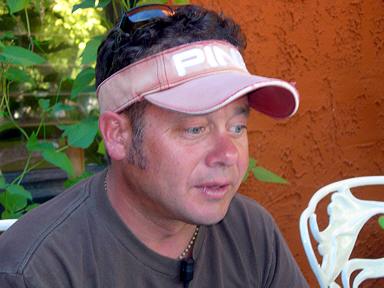1
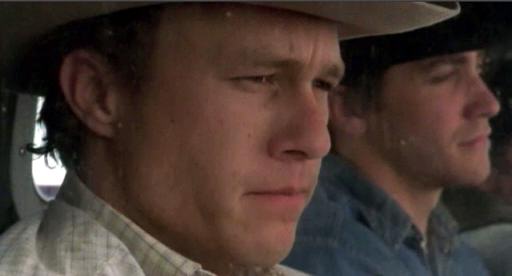
The Basque drives the boys towards Brokeback Mountain.
(Deleted Scene)
Do you remember where it was shot?
Yeah, we went to Carseland to shoot it,
and I drove the truck myself, which was an adventure in
its own right. Number one, I’m a little guy and just
to reach the pedals and pop the clutch on this big
old—I think it was like a 3-speed or
4-speed—and it was on a gravel road.
And Ang said, “We want you to go
around the corner faster,” and it was almost like I
was my own stunt driver. And then they wanted me to stop,
of course, right on the mark, so that was sort of a
challenge, but we managed to do it in about six or seven
takes.
And it was kind of neat in terms of my
character’s development because now, as you know,
the Basque just kind of pops out of nowhere. It’s
kind of like, “Wow! Where’s this from?”
There’s no historical context or
continuity, anything that explains why there’s just
all of a sudden this Spanish guy in the middle of
nowhere, where historically it was true that a lot of the
Basques worked in the area because they actually
fled—I wouldn’t necessarily say they were
refugees, but they got out of the country because of all
the troubles that were going on there—the fighting
between the Basque and the Spanish, and the Basque and
the French. Because they considered themselves kind of an
independent country. They’ve got their own flag, and
this rickety fence that goes all the way around what they
consider their area, their country. [1]
Do you remember any of the dialogue
that took place when you were in the truck?
Yeah, let’s see if I can remember.
The dialogue driving out was something like—Joe was
the boss, so it was talking about the boss—something
like, “Whatever you do, don’t piss Joe off
because you wouldn’t like him when he’s
mad.” That was driving them out.
[1] For more about Basques in
America, see www.cowboyshowcase.com/basque.htm
2
And then driving home, picking them up
and driving them back, the questions were “So, did
you have enough to eat?” Nothing. “You seem
awfully quiet.” Nothing. “Alright then, fine. I
can tell you don’t want to talk” and I just
kept driving.
You know, when I think about why they may
have cut it, maybe the sound didn’t work, or for
numerous reasons they already changed the story, or they
wanted to simplify it, which I understand. But a huge
rainstorm came in just as we were hooking up the trailer
for the shot, the final of me picking them up when I was
driving them back—a huge rainstorm. So the sound was
very difficult and we only got in about two
takes—that was it—and we wound up running for
cover.
The truck was on a trailer at this
point?
Yeah, it was on a trailer. They were
towing the truck; I didn’t have to drive.
That’s really interesting because
none of the scripts that we have include that scene after
the mountain.
You know, I could go down and dig up the
script I have and see if the scene is in there. I’ll
hang onto that script forever.
What’s interesting is, in the script
that I’ve got, they added lines and the part with me
picking them up. When they called me up they said they
definitely wanted me for three days, maybe as many as
eight, but they booked me for five days. But there were
scenes that were given to me on the spot. I think the
writer [Diana Ossana] was writing as she went along. She
was there deciding what worked and what didn’t.
Who actually contacted you about the
part?
My agent. Yeah, my agent. She gave me a
ring and said “Here’s your auditions” and
I read the script and I just knew immediately that I
wanted it; I had to have it. I have Spanish blood but
it’s not very often I get to play a Spanish role.
I grew a handlebar [moustache] and
started to tan, and then went to the audition completely
in character. And I went for two callbacks and my second
callback was with Ang Lee, and it was really interesting.
It was in the Pallister Hotel where he did the final
callbacks.
And I was super focused and really
wanting to stay in character, even as I was waiting to go
in, so when I went in I was still that character.
And I did it, and remained in character.
Got in there and remained in character. Cracked him up.
Ang was laughing his head off and the producers were
laughing their heads off. And Ang looked at me and he
said [speaking slowly] “Where are you from?”
And I’m still in character so I’m like,
“What do you mean?” And he said, “Where do
you live?” And I broke out of character and I said
“Oh, I’m from Calgary.” And then I
thought, “Oh no, what have I done?!” I thought
I had completely blown it.
3
And what ensued was that a call came
directly to my home, not to my agent, to my home, from
New York at a random time, and they were really, really,
really vehement about the fact that I had a Spanish
background, and as it turns out I do. It was my
mother’s grandma who came from Cadiz, Spain, and
that’s all they needed to know. Because they really
wanted to cast it authentic, and they really wanted me,
which I felt honored about, of course, but they just had
to make sure that there was some sort of Spanish heritage
or link.
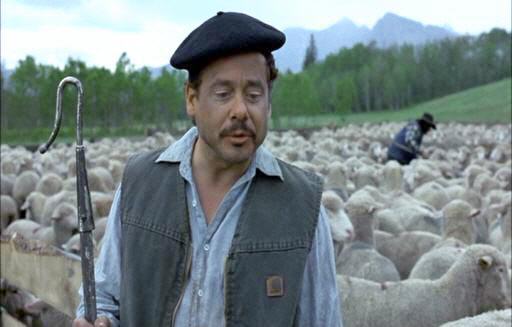
A Bronzed Basque at the Sheep Staging Area
Morley, AB
[Holding up a photo] How much of this
is tanning and how much is makeup?
That’s tanning. That’s just
tanning. They did not put a lot of makeup on that. They
put some dirt and stuff, and some henna solution.
[David’s wife, Tanya, joins us.]
What did they tell you about the role?
They didn’t tell me much about the
role.
A lot of it came from the script. A lot
of it came from my own research about the Basques and the
Basque influence in Wyoming during that time period.
I’m not a big wig. I don’t have
a personal assistant. I have to figure it out on my own.
And the more you do that, the more you can bring
authenticity to whatever character you’re trying to
play.
4
Is that the way it usually
is—someone gathers up all this information for you?
I don’t know. [Laughter.] I’ve
never been there. I just assume that they would have
people who would say, “Here, read this. Read this.
Read this,” as opposed to me getting my library card
and going to the library and trying to figure it out on
my own. But I don’t really know; it’s a
different level.
Ang Lee directed you?
It was Ang. Super, super particular.
Super particular. At the Basque Bridge, we sat—for
the right lighting—we sat for that for about an
hour-and-a-half by the bridge. At one point Heath had his
shirt off, his jacket off, and [pointing to screen cap]
see that wire there? He was hanging and going hand over
hand along the wire.
Ang kept looking through his finder and
waiting and waiting and waiting, and people were making
fun, and the great thing—Ang has a great sense of
humor—so they were taking the piss out of him, and
he was taking the piss back out of them. It was such a
relaxed, amazing set because of him. It’s trickle
down, right? And Ang Lee, right at the top of that totem
pole, being such a sweet man, affected everyone. Like for
Heath to be able to take off his shirt and start
monkeying around just shows you how relaxed it really
was.
But then, as soon as the right light
started to come, I remember Ang at one point looking up
and he said, “Okay, ten minutes. We have ten
minutes. Everyone be ready in ten minutes.” We
probably only have five, maybe ten minutes to get this
shot in. So everybody, just like gangbusters, getting
ready, getting set up to get this shot in, and he’s
like, “Okay, here it is, here it is. Ready? Ready?
Go.”
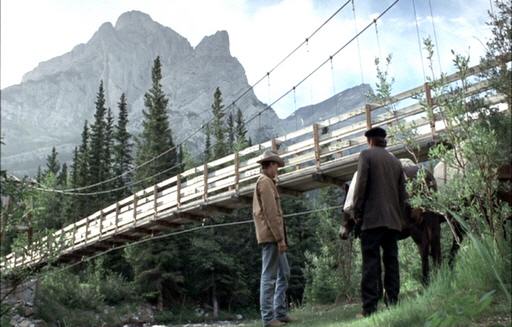
Ang Lee waited for the perfect light for his memorable
Basque Bridge scene.
Galatea Day Use Area Spray Valley Provincial
Park AB
5
And we probably did four takes. Four
takes was it, and then the light was done. That’s
it—we can’t shoot anymore because the
light’s done. And then it was over. We waited an
hour-and-a-half for five minutes of franticness.
Super particular cinematographer. It was
interesting to see how he worked. I mean, you wish you
could see what he sees. He sees something completely
different. For him, he needed those clouds like that
[pointing to picture], he needed the sun like that. He
saw it in his head before he ever shot it, right? So that
was neat.
Have you gone back there at all?
No, I haven’t. I want to though. I
couldn’t drive there if I had to right now!
It’s a beautiful, beautiful
place. And so close to the road.
Yeah, it is. Better for them. Easier
access for the cameras and whatnot.
What instructions did you receive? Do
you remember what Ang said to you?
[Laughs.] Yeah, for this particular
scene, “It’s too early in the summer to be sick
of beans,” he basically just said—he’s
real soft spoken, so in order for you to hear he just
comes right up close, and he gives you his direction, and
his direction was “You know you’re funny.”
And he looked at me and I’m like, “Okay, yeah,
I get that.” So in other words, don’t try to be
funny, you know you’re funny.
So that was his direction—“You
know you’re funny.”
What were your impressions of other
people in the cast?
Amazing. Yeah. I worked mostly with Heath
and Jake. That’s all I worked with; Heath, mostly.
Massive auras, massive auras in terms of, well,
they’re brilliant, they’re gorgeous. Let’s
just call it for what it is—they’re gorgeous
human beings. And that’s part of what the aura is.
And so, you’ve got to work with them, so you’ve
got to get inside that aura. And once you get in you
realize that they’re just a couple of kids, having a
good time, enjoying what they’re doing, and fun.
Just as interested in me as I was in them. Had some great
conversations, had some great laughs, and yeah,
they’re just a couple of really good looking young
guys. Super fun to work with and super relaxed.
And working with Ang, same
thing...I’ve been on many film sets, and it was
special.
6
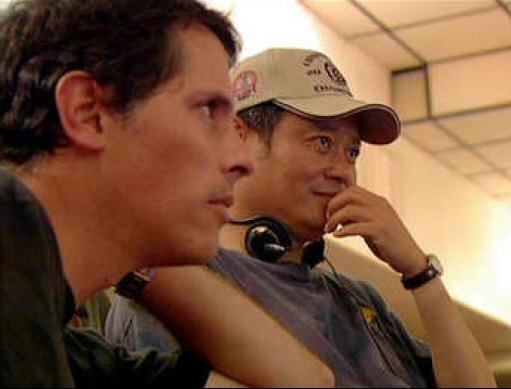
Colleagues Rodrigo Prieto and Ang Lee
Rodrigo Prieto – what were your
impressions of him?
The DOP [director of photography]? He
came up to me my very first day on set and he said
[random Spanish words], so I said “Hablo poquito
España” [sic] and he said “Oh...okay,”
but jokingly, you know? And he walked away.
He’s very professional and he runs a
super tight ship. That’s my perception of him. I
think he was hoping that here was someone—I might
have had a better rapport with him. I think he was
disappointed I couldn’t speak Spanish with him.
What was it that he said to you?
I have no idea what he said; I just made
that up! My response to him was “I only speak a
little Spanish.”
So that was that. Super professional. He
runs a tight ship. And he expects you to work in a
professional manner, and if you do you get on, and you do
your job professionally, as best you can. You don’t
want to get in the way. You don’t want to be that
guy.
Do you know any of the other people
who were in the cast?
Yeah, what’s interesting is a lot of
the locals that I know about that were in the cast were
edited out. One of the ladies, she had a full day working
with Heath and Jake. I think she said she was a bar
manager or something like that, and then, at one of their
meetings later, after the mountain, she hung out and
talked with them as her character. She had a wonderful
scene with them but she was cut right out of the movie.
7
But if you look at the credits, her name
is Val Planche, she’s in the credits at the end of
the film, but she’s not even in the movie. So, I
know her.
I know Duvall Lang. Once again, he was
only shown briefly but he is the announcer at the rodeo.
He runs a theatre company in town here called Quest
Theatre, and he’s a local actor, actually lives
right up the street there. Super nice guy, super nice
guy.
Steve Gin, of course. I know Steve.
Tom Carey, he’s the cowboy [rodeo
clown] who Jake goes up to in the bar. I forget the
comment he makes.
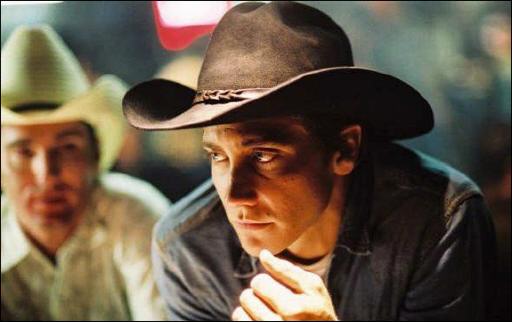
Tom Carey and Jake Gyllenhaal at the Electra Bar
Calgary, AB
There are a lot of local actors who were
in it. Another friend of mine, Jim Leighton, he was in
it. That got cut right out. And you often wonder
why—it didn’t work, or they have to edit, which
I understand. And you talk to some people and their
theory is that when you come and shoot in Alberta
there’s a mandate to actors, which is the union
[rules], that you have to hire a certain percentage of
local actors who have to be part of the film up-front
payroll, so they do this. But then when they start to
edit, a lot of it gets cut right out. It happens quite a
bit when these movies get to post-production. I tend not
to believe in that because everything I’ve ever
done, except for the odd edit here and there, has shown
up, you know? It would be hard to say. But there were
quite a few, quite a few that I know, and, like I said,
two of them didn’t even show up, and Du’s
[Duval Lang’s] face isn’t shown, but his voice
is there.
What was your reaction to the film
overall?
It’s amazing. It was a great film.
We went with a group of about twenty
people when we went to the theater to see it the first
time—paid to get in—and I was sitting next to
my oldest friend, Shane Miller. We tree-planted together
and we were super close; as super close as two guys can
be without being gay. And it was our story. We both said
“Yeah, that’s us.” We get it. We
understand that connection.
8
When you’re working in the middle of
the woods tree-planting it gets really primal, it’s
all stripped away and then here you are. So we actually
understood the primacy, the primal connection that these
people felt for each other, and Shane and I love each
other and that’s the way it is, right? The movie
meant a lot to me.
It was a love story, plain and simple,
and a tragic one at that, but the story is so simple. And
to me that’s the best part of it.
It’s amazing what we can convey just
through simplicity. We don’t need complex themes, or
complex plot lines, or this and that. It’s a simple
love story. Star-crossed lovers who for whatever reasons
aren’t allowed to...It’s Romeo and Juliet, you
know, but simpler. The Montagues and the Capulets.
I have a lot of friends of mine,
homophobic friends of mine, who won’t go to see the
movie because they know it’s a “gay cowboy
movie.” They’re missing out on so much, living
their lives in that fear, that fear that I don’t
understand but I feel bad for them.
Has it changed your career?
Yeah, I had a really good run after Brokeback.
It was back to back to back to back. Every part I
auditioned for, I got. But it’s tapered off right
now. The film industry in Alberta right now has dropped,
because the Canadian dollar is almost at par with the
American dollar. There’s only one American film
being shot here right now. I think even that summer there
were five films being shot, with this film being the
biggest one. Last summer there were fifteen films, movies
of the week and feature films.
So I had a super good run there for
awhile, a run that will continue once the industry picks
up again...or we move.
Tanya: Your agent retired.
David: That’s a good point.
That’s a really good point. I had a really good
agent. She loved me. I wasn’t a number. With Susan I
was a person, and that makes a huge difference. I was a
person with her. She’d bend over backwards to get me
auditions like this. She had an idea of what I was good
for or what I wasn’t good for.
So yeah, we should move or change agents!
Where would you move to?
Tanya: The beach. [Laughter.]
David: We’ve talked about it quite
often. It’s a dream—just to sell everything
that we’ve worked so hard for, all of this, and
move, and live on a beach and open a little bed and
breakfast, have a simple life and just raise our child.
We love the ocean. Maybe in Spain or Portugal. Yeah,
really move. Go for a complete life change.
9
I was going to suggest Maine, but I
guess Portugal would beat that!
Maine is beautiful, too.
Tanya and I were in Las Vegas—August
of last year? We were staying at Caesars Palace and we
were standing in a big, long taxi queue, and it was hot,
hot as stink, and these sedans drove up and we started
thinking that maybe we should just hop into one of those
nice Lincoln Town Cars and have them take us. And there
was this Hummer which was gold, this limo thing that
pulled up, with gold hub caps and all, and it was like
there was a spotlight on it. And the driver comes around
and opens the door and Jake Gyllenhaal and Kirsten Dunst
come running up to the Hummer, and we were standing there
in the taxi queue again. It just put it all in
perspective. Hopped in his Hummer, living the life.
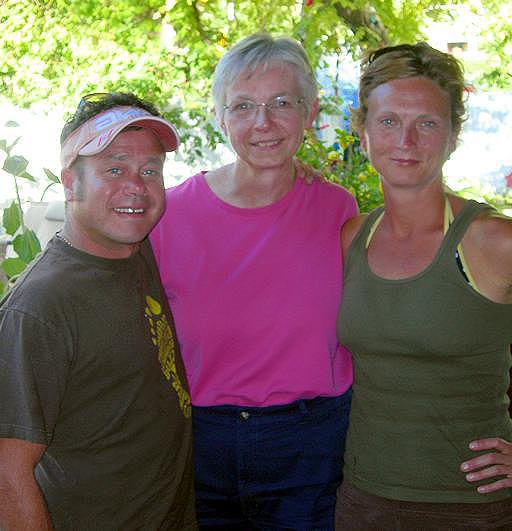
Dave, Lauren, and Tanya
It must have been a heady experience
when it was on everybody’s mind.
It still is.
Tanya: His friends called him Dave “Brokeback”
Trimble.
What are you doing now?
I’m in rehearsals for a play that I
wrote. It’s a one act. I’m also acting in it,
reluctantly. I would like to have just seen it done. So
that’s this project, and it will sort of dovetail
into what will be my theater season, which has already
started. Another year—it pays the bills. Live
theater is my bread and butter. I really enjoy doing film
when it’s available. I really, really enjoy doing
film if it’s available.
10
I’d do film over that if I had a
choice, but theater is something that I’m very good
at, and something that pays the bills right now. So keep
her going; life is too short. Do what you love.
[Signing screen caps of the Basque and
Ennis at the bridge.]
I should write “Keep your hands off
my ass.”
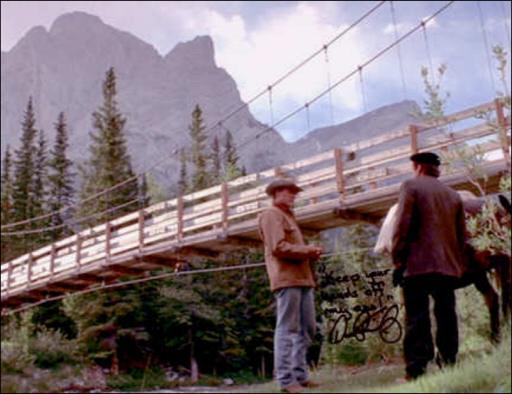
Write whatever you want, David,
whatever you want.
Write whatever you want, David,
whatever you want. Ang Lee had it right. You are a funny
guy!
11
|
